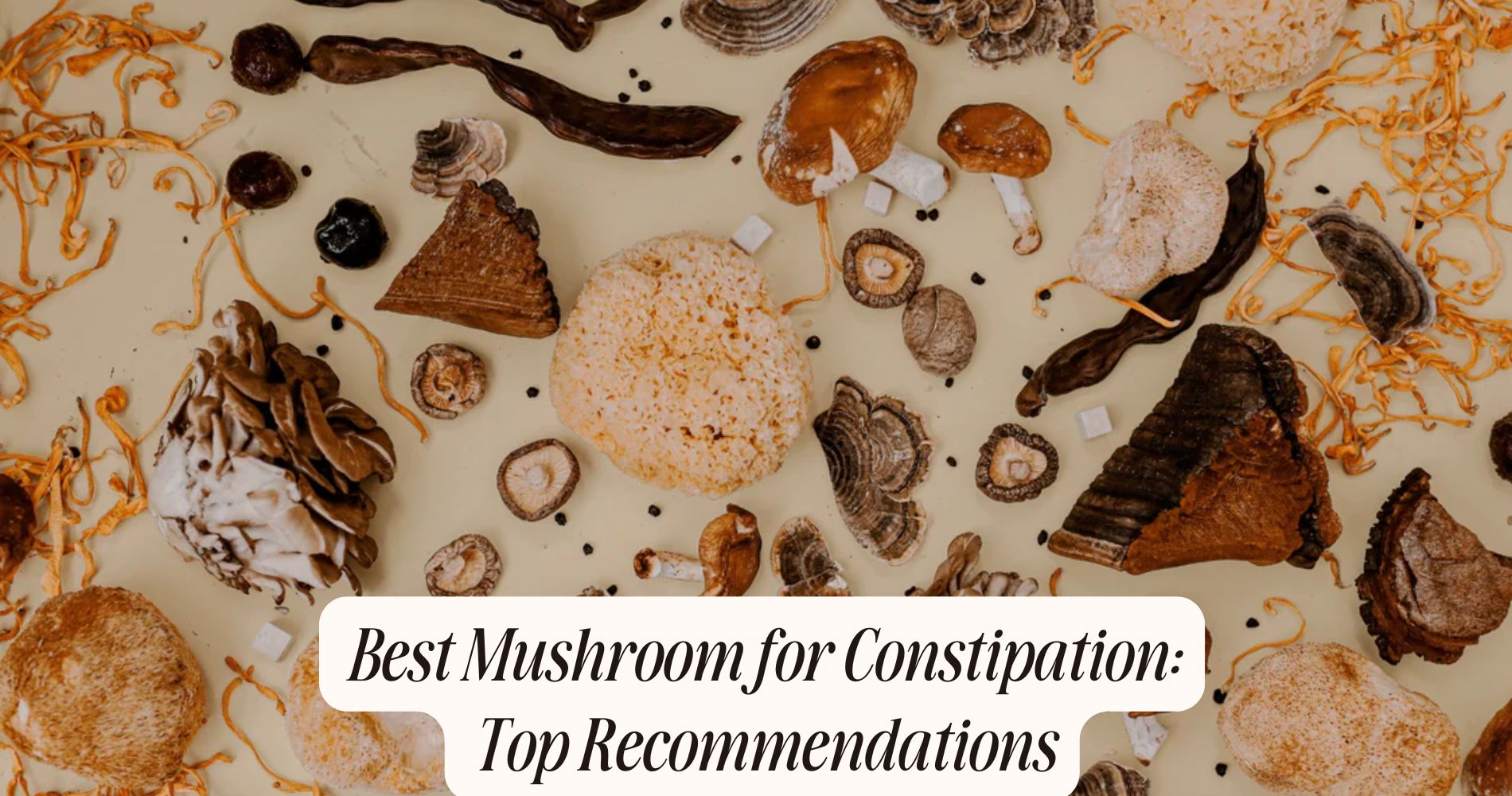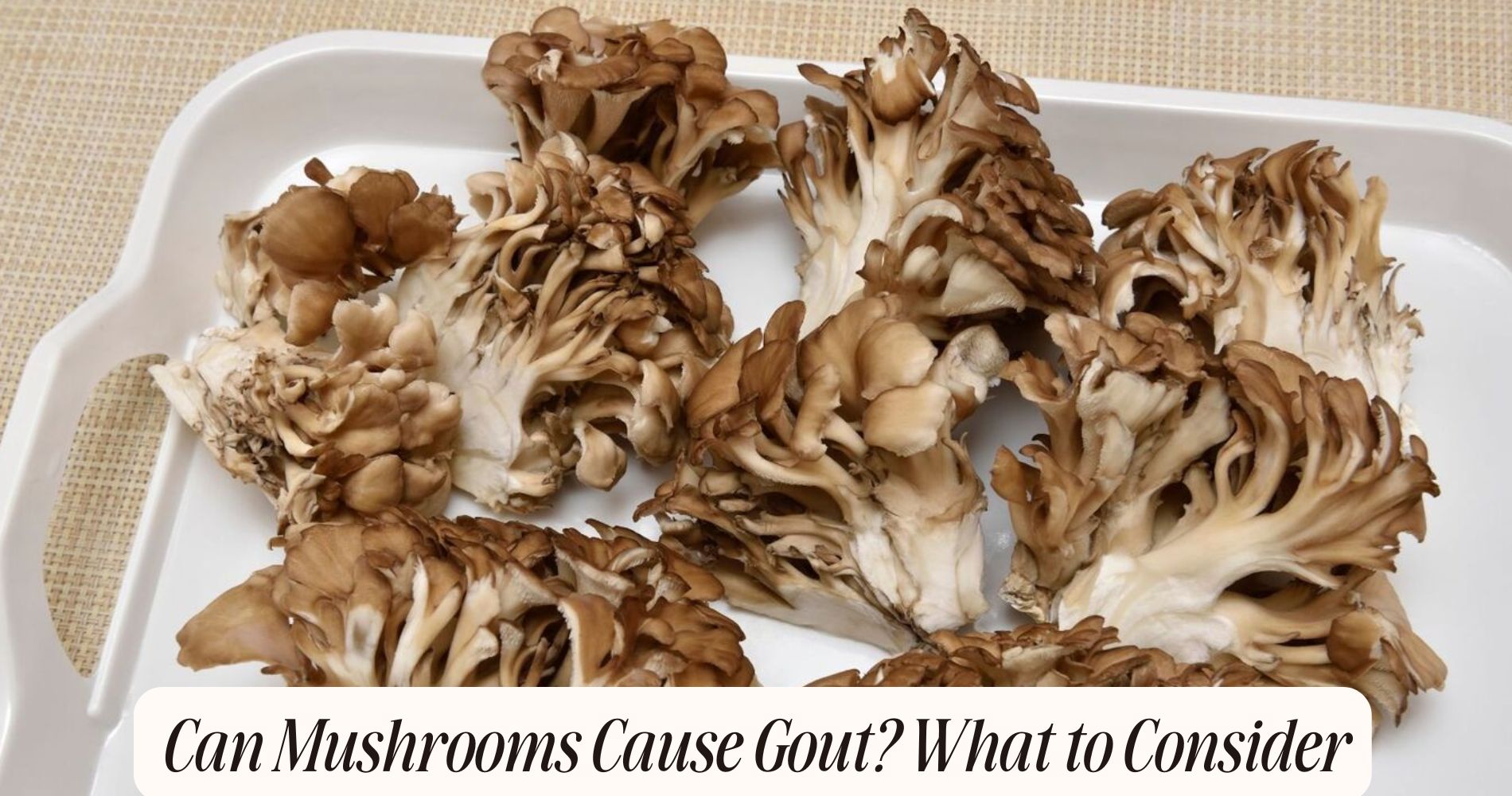
Is Mushroom Good for Sugar Patients? Learn the Truth
Is mushroom good for sugar patients? Mushrooms can be a great addition to your diet if you're managing diabetes. They're low in calories and carbohydrates, which helps prevent blood sugar spikes. With high fiber and antioxidants, mushrooms support better glucose regulation and promote digestive health. Varieties like shiitake and maitake are particularly beneficial due to their unique compounds that may enhance insulin sensitivity. Plus, they're versatile in meals. However, it's important to watch for allergies and make sure you avoid toxic types. There's much more to take into account about incorporating mushrooms into your routine, so keep exploring the details to enhance your health!
Nutritional Profile of Mushrooms
When it comes to managing blood sugar levels, understanding the nutritional profile of mushrooms can be quite beneficial. Various mushroom varieties, such as button, shiitake, and portobello, offer unique flavors and nutritional benefits that can enhance your diet. These fungi are low in calories, fat-free, and contain no cholesterol, making them a healthy addition to your meals.

Mushrooms are rich in essential nutrients like B vitamins, selenium, and potassium, which play a role in overall health. Their high fiber content can aid digestion and help maintain a healthy weight, both of which are vital for managing blood sugar levels. Additionally, mushrooms have a low glycemic index, meaning they won't cause rapid spikes in blood sugar after consumption.
In culinary uses, mushrooms can be incredibly versatile. You can sauté, grill, or add them to soups and salads, providing you with endless meal options. Their umami flavor can enhance dishes while keeping them nutritious.
Impact on Blood Sugar Levels
When considering mushrooms' impact on blood sugar levels, it's crucial to look at their nutritional composition and glycemic index.
These low-calorie, low-carb foods can be beneficial for managing blood sugar levels due to their minimal effect on glucose spikes.
Additionally, the antioxidants found in mushrooms may contribute to overall metabolic health, making them a worthy addition to your diet.
Nutritional Composition Overview
The nutritional composition of mushrooms offers a promising avenue for managing blood sugar levels in individuals with diabetes. Different mushroom varieties, such as shiitake, portobello, and maitake, provide unique benefits while being low in calories and high in nutrients.
These fungi are rich in fiber, which plays an essential role in regulating blood sugar by slowing digestion and promoting satiety. Mushrooms also contain essential vitamins and minerals, including B vitamins, selenium, and potassium, which can support overall health and metabolic function.
Their low carbohydrate content makes them a suitable choice for those concerned about blood sugar spikes. Additionally, certain compounds found in mushrooms, like beta-glucans, may improve insulin sensitivity, making them even more beneficial for blood sugar management.
When incorporating mushrooms into your diet, consider your overall dietary considerations. Pair them with other low-glycemic foods to enhance their effects.
It's important to maintain a balanced diet that includes various vegetables, lean proteins, and whole grains. Overall, mushrooms can be a flavorful and nutritious addition to meals, helping you manage your blood sugar levels effectively.
Glycemic Index Insights
Understanding the glycemic index (GI) of foods is essential for managing blood sugar levels, especially for individuals with diabetes. The GI measures how quickly a food raises blood sugar after consumption. Foods with a low GI are ideal for maintaining glycemic control, as they cause a gradual increase in blood sugar.
Mushroom varieties, such as button, shiitake, and portobello, generally have a low glycemic index. This means they won't spike your blood sugar levels considerably, making them a smart choice for your meals. Incorporating these mushrooms into your diet can provide essential nutrients while helping you maintain stable glucose levels.

Moreover, mushrooms are low in calories and high in fiber, which further supports blood sugar management. The fiber content slows down digestion, leading to a more gradual release of glucose into the bloodstream.
It's crucial to recognize that the method of preparation can also influence the overall impact on blood sugar; opting for cooking methods like steaming or sautéing can be beneficial.
Antioxidant Benefits Explained
Mushrooms are packed with antioxidants, which play a fundamental role in managing blood sugar levels. These antioxidants help combat oxidative stress, a condition that can lead to insulin resistance and higher blood sugar. By including various mushroom varieties in your diet, like shiitake, maitake, and reishi, you can leverage their unique antioxidant properties.
Mushrooms contain phenolic compounds and polysaccharides that act as powerful antioxidant sources. Studies suggest that these compounds can enhance your body's ability to regulate glucose, potentially lowering the risk of complications associated with diabetes. For instance, research has shown that certain mushroom varieties can improve insulin sensitivity, making it easier for your body to utilize glucose effectively.
Additionally, the anti-inflammatory properties of these antioxidants support overall metabolic health, which is essential for anyone managing blood sugar levels. By incorporating mushrooms into your meals, you not only enjoy their rich flavors but also boost your antioxidant intake.
Types of Mushrooms Beneficial for Diabetics
When considering mushrooms for a diabetic diet, it's crucial to understand their nutritional value and how they can positively impact blood sugar levels.
Many types, such as shiitake and portobello, have a low glycemic index, making them a smart choice for maintaining stable glucose levels.
Additionally, their antioxidant properties may offer further health benefits that support overall wellness.
Nutritional Value Overview
A variety of mushrooms can play a significant role in managing blood sugar levels for diabetics. Different mushroom varieties, such as shiitake, maitake, and reishi, aren't only delicious but also packed with essential nutrients. They contain low calories and are rich in fiber, which can help regulate blood sugar and improve digestion.
Mushrooms are also a great source of antioxidants and vitamins, including B vitamins and vitamin D. These nutrients support overall health and can help combat inflammation, which is particularly beneficial for those with diabetes.
For instance, maitake mushrooms have been shown to enhance insulin sensitivity, potentially lowering blood sugar levels.

Additionally, mushrooms have a unique compound called beta-glucans that may contribute to better glucose management. This health benefit makes them an excellent addition to your diet.
Incorporating these mushroom varieties into your meals can provide not only flavor but also valuable nutrients that support your diabetic management plan. So, consider adding mushrooms to your dishes for a tasty and healthful option that aligns with your dietary needs.
Low Glycemic Index
For those managing diabetes, including mushrooms with a low glycemic index in your diet can be particularly beneficial. These mushroom varieties, such as shiitake, portobello, and button mushrooms, have minimal impact on blood sugar levels, making them excellent choices for your meals.
Low glycemic index foods help maintain stable blood glucose levels, which is vital for diabetes management. Shiitake mushrooms, for instance, not only offer a rich, umami flavor but also provide various nutrients, including B vitamins and minerals.
Portobello mushrooms are another great option; their meaty texture enhances many dishes while keeping your glycemic response low.
Incorporating these mushrooms into your diet can offer culinary benefits, too. They can be grilled, sautéed, or added to soups, allowing for versatility in your meal prep.
Button mushrooms, the most common variety, can be easily added to salads or stir-fries, providing flavor without the carbs.
Antioxidant Properties Explained
Many people may not realize that certain mushrooms are packed with antioxidants, which can be particularly beneficial for individuals managing diabetes. These antioxidants work through various mechanisms to protect your cells from oxidative stress, a common issue in diabetes.
For instance, mushrooms like shiitake and reishi are known for their high antioxidant content, which helps combat free radicals in your body. The antioxidant mechanisms found in these mushrooms contribute to cellular protection, reducing inflammation and potentially lowering the risk of chronic diseases associated with diabetes.
By including mushrooms in your diet, you're not just adding flavor; you're also enhancing your overall health through their unique phytochemicals. Additionally, studies suggest that the beta-glucans found in some mushroom varieties can further support immune function and improve metabolic health, making them a smart addition to your meals.
When you choose mushrooms like maitake or lion's mane, you're harnessing their full potential to benefit your health. So, consider incorporating these nutrient-dense fungi into your diet to leverage their antioxidant properties and support your journey in managing diabetes effectively.
Antioxidant Properties of Mushrooms
Numerous studies highlight the impressive antioxidant properties of mushrooms, making them a valuable addition to the diets of individuals managing blood sugar levels. Different mushroom varieties, such as shiitake, maitake, and reishi, exhibit distinct antioxidant mechanisms. These mechanisms help combat oxidative stress, which can negatively impact overall health and insulin sensitivity.
Mushrooms contain bioactive compounds like polysaccharides, ergothioneine, and polyphenols that contribute to their antioxidant capacity. These compounds work to neutralize free radicals, reducing inflammation and potentially lowering the risk of chronic diseases associated with diabetes. Research has shown that incorporating mushrooms into your diet may enhance your body's ability to manage blood sugar levels effectively.

Moreover, the potential benefits of mushrooms extend beyond their antioxidant properties. They may also support immune function and improve gut health, factors that are essential for individuals with diabetes.
Fiber Content and Diabetes Management
Incorporating fiber-rich foods like mushrooms into your diet can greatly aid in diabetes management. Mushrooms are low in carbohydrates and high in fiber, making them an excellent choice for maintaining stable blood sugar levels. The fiber benefits go beyond just blood sugar control; it promotes digestive health as well.
Dietary fiber helps slow down the absorption of sugar in your bloodstream, which can prevent spikes in glucose levels. This is particularly important for you as a diabetes patient, as managing your blood sugar is vital for overall health. Additionally, fiber adds bulk to your meals, helping you feel fuller for longer, which can aid in portion control.
Moreover, the soluble fiber found in mushrooms can help lower cholesterol levels, further supporting heart health—an important consideration for those with diabetes.
Mushrooms and Weight Control
When it comes to weight control, mushrooms can play an important role due to their low calorie density and high nutritional value. You'll find that most mushroom varieties, like button, shiitake, and portobello, are low in calories but rich in essential nutrients. This means you can enjoy a hearty portion without worrying about excessive calorie intake.
Incorporating mushrooms into your meals can aid in weight management by providing bulk and flavor, making your dishes more satisfying. Their high water content and fiber help you feel full longer, which can prevent overeating. Research shows that diets rich in low-calorie foods like mushrooms can contribute to better weight loss outcomes.
Furthermore, mushrooms are versatile and can easily replace higher-calorie ingredients in your favorite recipes. For instance, using portobello mushrooms as a burger substitute can considerably cut down on calories while still delivering a satisfying meal.
When you enjoy a variety of mushroom types, you not only diversify your diet but also guarantee a broad intake of nutrients beneficial for overall health.
Potential Risks of Mushroom Consumption
While mushrooms offer many benefits, including their role in weight management, it's crucial to be aware of the potential risks associated with their consumption. One significant concern is the risk of mushroom allergies. Some individuals may experience allergic reactions, ranging from mild symptoms like itching and hives to severe reactions requiring medical attention.
If you're unsure about your sensitivity, it's prudent to introduce mushrooms gradually into your diet.
Another critical issue is the presence of toxic varieties. Not all mushrooms are safe to eat; some can be poisonous and even fatal. For instance, the death cap mushroom contains toxins that can cause severe liver damage.
Always verify you're purchasing mushrooms from reputable sources to minimize this risk. If you forage for wild mushrooms, it's vital to be knowledgeable or consult an expert, as misidentification can lead to serious health consequences.
Cooking Methods for Diabetic-Friendly Meals
Cooking methods play a crucial role in creating diabetic-friendly meals that can help manage blood sugar levels. Choosing the right techniques can enhance the flavor of your dishes without adding unnecessary calories or carbohydrates.
One effective method is sautéing, which involves cooking food quickly in a small amount of healthy oil. By using sautéing techniques, you can retain the nutrients in vegetables, including mushrooms, while adding delicious spices or herbs for flavor.

Grilling options are another excellent choice for preparing meals. Grilling helps to reduce fat content while adding a smoky flavor that enhances the taste of your food. Lean meats, fish, and vegetables work well on the grill, making it easy to create balanced meals that fit your dietary needs.
Both sautéing and grilling allow you to use fresh ingredients, which are essential for a healthy diet. By focusing on these cooking methods, you can enjoy tasty meals that support stable blood sugar levels.
Expert Opinions on Mushrooms for Diabetes
Mushrooms have gained attention in discussions about diabetes management, with many health experts highlighting their potential benefits for blood sugar control. Various mushroom varieties, such as shiitake, maitake, and reishi, are being studied for their unique properties that may positively influence glucose metabolism. Research indicates that certain compounds in mushrooms, including polysaccharides and antioxidants, could enhance insulin sensitivity and reduce blood sugar spikes.
Diabetes research supports the idea that incorporating mushrooms into your diet might be a smart choice. Their low-calorie, low-carb nature makes them a fitting option for those looking to manage their weight and blood sugar levels. Some experts point out that the fiber content in mushrooms can also aid in digestion and help regulate blood sugar levels.
However, while the evidence is promising, experts emphasize the importance of viewing mushrooms as part of a balanced diet rather than a standalone solution. It's crucial to consult with healthcare professionals to tailor dietary choices to your specific health needs.
Practical Tips for Incorporating Mushrooms
Incorporating mushrooms into your diet can be both easy and beneficial for managing blood sugar levels. These versatile fungi can add flavor and nutrition to your meals without markedly impacting your glycemic index. Start by exploring simple mushroom recipes, like sautéing them with garlic and olive oil as a side dish or adding them to salads for extra texture.
When it comes to cooking techniques, consider grilling or roasting mushrooms to enhance their natural umami flavor. You can also blend finely chopped mushrooms into sauces or soups, which not only boosts the nutritional profile but also helps reduce the need for additional fats or sugars.
Don't forget about the various types of mushrooms available—each offers unique health benefits. For instance, shiitake and maitake mushrooms may support immune function and blood sugar regulation.
Incorporate mushrooms into breakfast by adding them to omelets or whole-grain toast. Experiment with different varieties to keep your meals interesting and enjoyable.
Support Your Health Naturally with SUPER MUSHROOM GUMMIES
Wondering is mushroom good for sugar patients? Well Gummies’ SUPER MUSHROOM GUMMIES offer a convenient way to enjoy the benefits of 10 powerful mushrooms, including those known to support blood sugar levels. These chewable gummies help fuel your brain, provide calm energy, and boost immune function—all with a delicious wild berry taste. With no jitters or crash, they're the perfect addition to your daily routine for balanced energy and a clear mind. Try them today for a tasty, natural way to support your overall wellness!
Frequently Asked Questions
Can Mushrooms Cause Allergic Reactions in Some Individuals?
Yes, mushrooms can cause allergic reactions in some individuals. Your immune response might identify certain proteins in mushrooms as harmful, leading to mushroom allergies. If you experience symptoms, consult a healthcare professional for guidance.
Are There Any Mushroom Varieties to Avoid for Sugar Patients?
When managing sugar levels, you should avoid mushroom varieties high in carbohydrates, like certain wild mushrooms. Stick to those lower in carbs, as they support better sugar management without compromising your health.
How Should Mushrooms Be Stored for Maximum Freshness?
To maximize freshness, store mushrooms in a paper bag in the fridge, not plastic. This allows airflow, preventing moisture buildup. Follow these mushroom storage tips, and you'll enjoy their flavor and texture longer.
Do Mushrooms Interact With Diabetes Medications?
Mushrooms don't typically interact with diabetes medications, making them a safe choice. Their benefits in diabetes management include potential blood sugar regulation and low-calorie nutrition, enhancing your meals without compromising your health. Enjoy them!
Can Mushroom Supplements Be Beneficial for Sugar Patients?
Mushroom supplements can offer potential benefits for diabetes management. They might help regulate blood sugar levels and improve insulin sensitivity. However, it is crucial to consult your healthcare provider before adding them to your regimen.
Conclusion
Incorporating mushrooms into your diet can be beneficial for managing blood sugar levels, thanks to their low calories, high fiber, and antioxidant properties. Different types of mushrooms offer unique advantages, making them a versatile addition to meals. However, it's crucial to be mindful of any potential risks and to consult with a healthcare professional. By choosing healthy cooking methods and enjoying a variety of mushrooms, you can enhance your diet while supporting your overall health as a diabetic.




